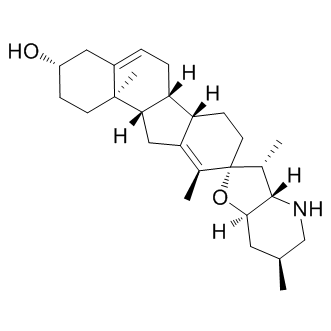| References: |
Cyclopamine(11-Deoxojervine) is a specific Hedgehog (Hh) signaling pathway antagonist of Smoothened (Smo) with IC50 of 46 nM.
in vitro: Cyclopamine inhibits the Hedgehog signaling pathway with an IC50 of 46 nM, and blocks the activity of human Smo receptor expressed in CHO-K1 cells in [3H]Hh-Ag binding assay with an IC50 of 280 nM. Cyclopamine significantly inhibits Hedgehog pathway activity in a dose-dependent manner in gut-derived tumor cell lines expressing Patched (PTCH) mRNA, and induces growth inhibition of those tumor cell lines by 75-95% at the concentration of 3 μM, but ineffective towards the colon tumor cells without PTCH mRNA expression, suggesting the effects of Cyclopamine treatment are Hedgehog pathway related rather than generally cytotoxic. By blocking Hedgehog signaling through direct interaction with Smo, Cyclopamine (10 μM) inhibits the proliferation of SMOhigh Cyclopamine-responsive cell lines L3.6sl and Panc 05.04 by 75-80%, and increases the apoptosis by 2.5- to 3.5-fold, without affecting the BxPC3-SMOlow cell line .Cyclopamine treatment significantly decreases of Snail mRNA and increasea E-cadherin transcripts in the E3LZ10.7 cell line. Independent of inhibition of cell growth, Cyclopamine treatment significantly inhibits the invasive phenotype of Hedgehog-dependent L3.6pl cells, causing a >500-fold reduction in the number of transmigrating cells, but not that of the Hedgehog-independent cell line Panc-1 .
in vivo: Administration of Cyclopamine at dose of 50 mg/kg/day for 22 days eradicates the HUCCT1 xenografts in mice with no obvious adverse effects . Cyclopamine treatment at dose of 1.2 mg for 7 days induces significant apoptosis of tumor cells and decreases the tumor mass by 50-60% in Panc 05.04- and L3.6sl-derived tumors, respectively, but not in the BxPC3-SMOlow tumors. Administration of Cyclopamine alone profoundly inhibits tumor metastases in xenografts of E3LZ10.7 and L3.6pl, and completely abrogates metastases when in combination of gemcitabine. |























